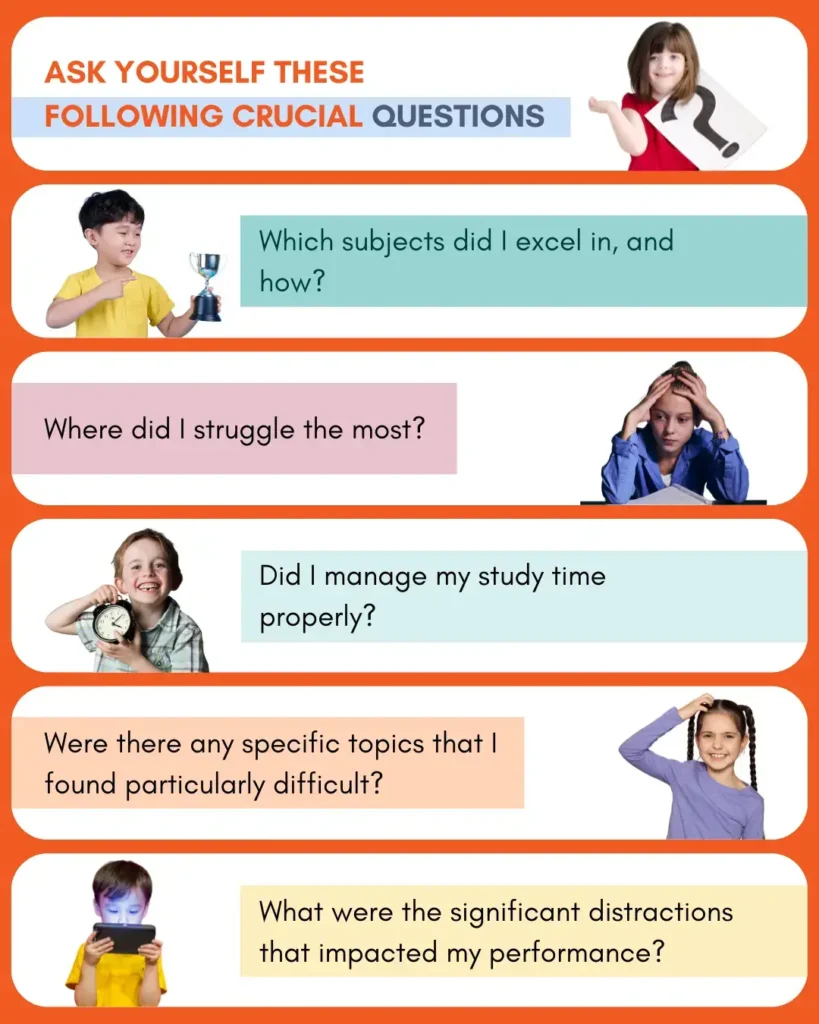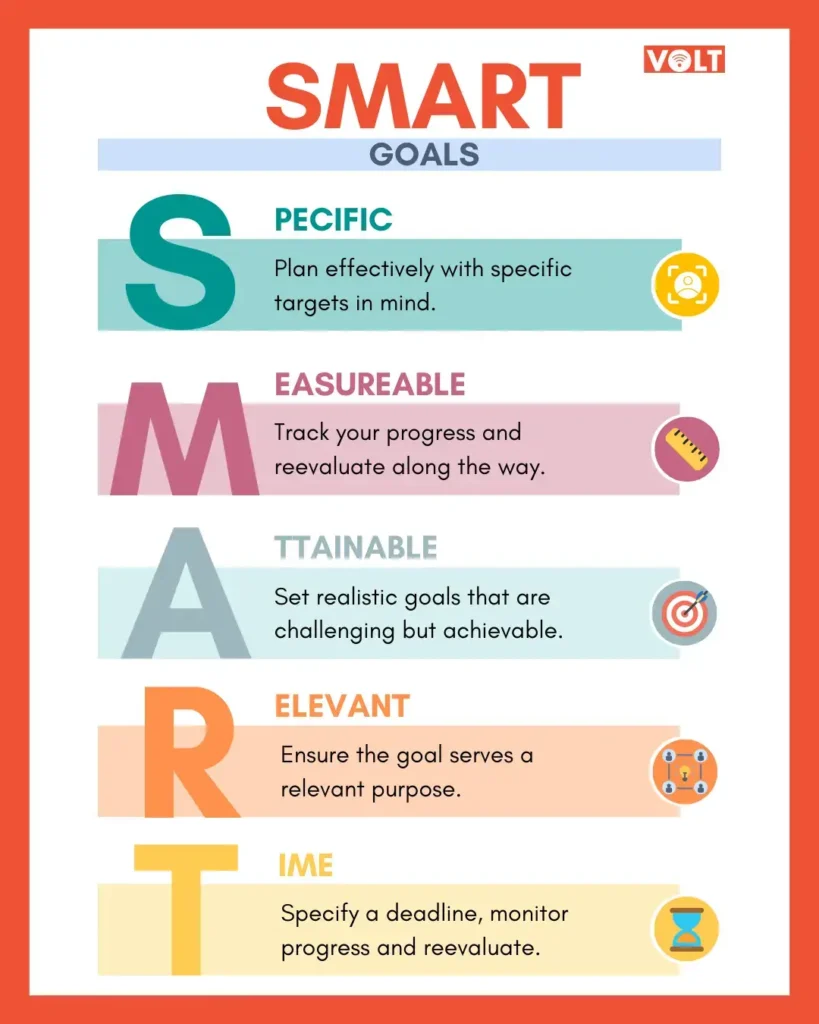What Comes After Results? How to Set SMART Goals for Your Next Academic Year
- Students
- March 15, 2025
- VOLT Learning

So, your results are out. You might be celebrating your achievements or feeling like you could have done better. But, the big question now is—what’s next? Your transition from one academic year to another is much more than just moving up a grade. This is a crucial step in your academic journey and holistic personal growth that demands careful planning and goal-setting. Without a clear roadmap, even the best intentions can fade as the year progresses. That’s why setting structured and SMART goals is crucial.
Instead of vague resolutions like “I will study more” or “I’ll get better grades,” students who focus on SMART goal setting that stands for Specific, Measurable, Achievable, Relevant, and Time-bound milestones achieve better outcomes. By reflecting on past performance, they understand what needs to be improved and create a clear plan to ensure that the next academic year is not just another cycle of studying but a step forward in personal and educational development.
It’s Time to Reflect on Your Exam Results
Before setting new goals, take a deep breath and indulge by looking back at your results. Reflection is one of the most powerful tools for growth, but many students skip this step, either out of excitement for the next year or because they want to forget disappointing results. However, self-reflection doesn’t mean dwelling on mistakes—it means learning from them.

Getting answers to these questions helps you identify patterns in your study habits and performance. You may have done well in subjects you practiced regularly but struggled in those where you left studying for the last minute. Perhaps you found certain concepts hard to understand because you didn’t seek help when you needed it. Recognizing these insights will help you create a more effective study plan for the following year.
Say YES to SMART Goals
SMART goals are a structured way of setting clear and practical objectives. Many of you set broad targets like “I will study harder” or “I want to improve in science,” but the lack of direction makes it difficult to track your progress. The SMART framework helps set actionable, achievable, and well-defined goals. Here’s how each component applies to academic success:

- Specific: Your goal should be clear and precise. Instead of saying, “I want to get better at Science,” a specific goal would be, “I will improve my Science grade by practicing 10 additional questions per chapter and reviewing my mistakes.”
- Measurable: If your goal is to increase your reading speed, a measurable goal would be, “I will read 10 pages daily and track my reading time to improve my speed.”
- Achievable: Keep your goals challenging yet realistic. For example, if you have scored 50% in Math, aiming for 100% immediately might be overwhelming. Try to set an achievable goal, such as “I will improve my Mathematics score by 10% in the next term by practicing regularly and seeking help from my teacher when needed.”
- Relevant: Your goal should align with your academic aspirations and personal development. For instance, if you want to pursue a career in engineering, try to focus on strengthening your Math and Science skills—make sure to keep relevant goals. Similarly, if you want to improve communication skills, setting a goal to participate in debates or presentations would be meaningful.
- Time-bound: Every goal needs a deadline to create urgency and motivation. Instead of saying, “I will start revising early,” a time-bound goal would be, “I will complete my first round of revisions two weeks before the exams begin.”
By following this approach, students can set goals that help them improve academically and develop discipline, focus and a growth mindset.
“Kickstart your SMART planning with our curated worksheet! Access it here.
Set Academic and Personal Goals for the Next Year
Now that you know the basics of the SMART framework, it’s time to apply it to your academic and personal life. To begin, you can categorize your SMART goals as academic and non-academic.
As the name indicates, academic goals focus on improving subject knowledge, refining study habits, and mastering new skills, while personal goals contribute to overall development and well-being. Both aspects are crucial for a balanced and fulfilling academic year.
For your academic goals, your focus would be on areas where you need attention or want to excel further. If Mathematics was a challenging subject last year, your goal would be, “I would improve my Mathematics grades by solving 10 extra problems per week.” Similarly, to enhance your English literacy or communication skills, set a target to “Read at least one English novel weekly”. This habit would help improve vocabulary and comprehension.
Personal goals help in character-building and self-discipline. A student who struggles with time management could set a goal such as, “I will follow a daily study schedule to balance academics and extracurricular activities effectively.” If screen time is an issue, the goal could be, “I will limit social media use to two hours per day to stay focused on my studies.” Fitness and mental well-being are also essential—exercising daily for 30 minutes or practicing mindfulness can contribute to a productive lifestyle.
By carefully balancing academic and personal goals, you ensure overall growth and development, making your learning journey effective and enjoyable.
Create a Roadmap for SMART Goal Setting
Throughout your journey, setting your SMART goal is the foundational step toward your success, but remember, you cannot proceed without a clear action plan. To turn aspirations into reality, you need a structured roadmap that outlines how to reach your objectives step by step. Here’s how you can create a practical roadmap:
1. Break your goals into smaller and manageable steps
Achieving big goals often feels overwhelming, and you may question your self-motivation as they are challenging. The smart approach is to break them into achievable milestones, keeping progress steady while maintaining high self-confidence.
How to Plan:
- Start by recognising the key action areas crucial to accomplishing your desired goal. For example, if your goal is improving your writing skills, list specific actions contributing to better writing.
- Set a timeline for each step. Rather than vaguely aiming to “improve writing,” create a structured plan:
• Daily: Read one article, short story, or book chapter to expose yourself to different writing styles.
• Weekly: Summarise what you read to enhance comprehension and vocabulary.
• Monthly: Share your work with a teacher or mentor for constructive feedback.
Outcome:
By breaking down your goals into simple, actionable steps, you will stay consistent and be able to avoid procrastination. Within a short period, you may notice gradual improvements and build self-confidence in your abilities when you accomplish smaller milestones.
2. Stay organized with proper time management
Time management is key to increased productivity, reduced stress, and staying on track. Many students struggle to balance academics with extracurricular pursuits and personal needs. Prioritizing effective time management with a proper schedule planner helps you stay disciplined by structuring your activities effectively.
How to Plan:
- Allocating specific time slots for each subject or activity can help you plan your study sessions, assignments, and deadlines. For instance, you can block 4:00-5:00 PM for mathematics problems and 6:00-7:00 PM for English language revision.
- Use reminders and notifications by setting alerts for essential deadlines to avoid last-minute cramming.
Outcome:
Using a structured planner, you could develop better time management skills with reduced stress from last-minute rushes. Advanced planning may also result in a balanced study routine that covers academics and personal time. Also, this way, you can do it.
Track progress systematically and adjust your strategy as per the requirements.
3. Seek support from teachers, mentors, and family
SMART goal setting doesn’t have to be a solo journey. You can always approach your parents and teachers to seek the proper guidance and attain notable improvements in your learning experience.
How to Plan:
- Join a study group or create one with classmates to encourage collaborative learning. This way, you not only reinforce concepts, but you clarify doubts.
- Consult teachers or mentors regularly and take their feedback seriously. Use their suggested improvements as a stepping stone to better study.
- Communicate with your parents whenever you feel pressured and tell them about your academic goals. They can be your greatest companions in choosing the right study resources and preparation strategies to excel in your goals with high energy.
Outcome:
You will gain valuable insights and personalized feedback to improve your performance by seeking support. You will feel motivated and less stressed when you achieve your goals successfully, knowing you have a support system.
Remember, you have already won the half-battle when you get clarity on your goals. With the right planning, you can expedite the journey by achieving academic excellence and developing important life skills such as time management, self-discipline, and perseverance.
By following this roadmap, you’re not just preparing for exams—you’re developing a mindset of continuous improvement that will benefit you in every aspect of life. With commitment and the right strategies, your academic year can be your most successful one yet!
SMART Goal Setting Becomes Easier With VOLT Learning
Success is not just about setting SMART goals—it’s about having the right resources to achieve them. As you enter a new academic year, take charge of your success with VOLT Learning. Prepare smartly with our pre-designed practice papers, online worksheets, and systematic testing assessments that come with progress trackers. We know every small step you take today will lead to more significant achievements tomorrow, and VOLT Learning sets the right path towards holistic learning with the right material.
>> Please Share



